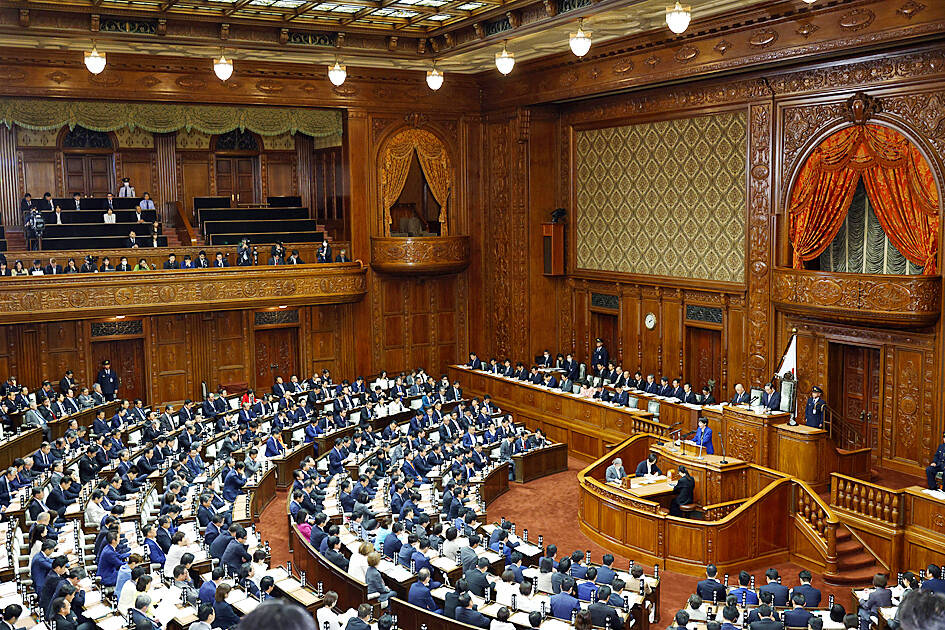Japanese Prime Minister Sanae Takaichi, in her first major policy speech yesterday, pledged to further accelerate Japan’s military buildup and spending, and complete an early upgrade of the country’s security strategy as tensions rise with China, North Korea and Russia.
Takaichi took office on Tuesday after being elected Japan’s first female leader. That ended months of a political vacuum amid power struggles within her party following consecutive election defeats that led to the ruling coalition’s loss of a majority in both houses of parliament.
Takaichi said her government would hit an annual military spending target of 2 percent of GDP by March, instead of by 2027 under the initial plan.

Photo: EPA
She would also revise the security strategy early and have it ready by the end of next year, she said. Japan used to revise its strategy about once a decade, the last time in December 2022.
Japan would upgrade its strategy early due to a change in the security environment, including Russia’s invasion of Ukraine and the Middle East conflict, she said.
“The free, open and stable international order that we were accustomed to is violently shaken in the face of historic change of power balance and intensifying geopolitical competitions,” Takaichi said in her speech at parliament. “In the region around Japan, military activities and other actions from our neighbors China, North Korea and Russia are causing grave concerns.”
“Japan needs to proactively push for a fundamental buildup of its defense power,” she said.
Her pledge yesterday came days before US President Donald Trump visits Tokyo on Monday for a summit, where she is expected to face tough demands from Trump, such as a further increase in Japan’s defense spending and more purchases of US weapons. Her meeting with Trump is part of a major diplomatic test that also includes two regional summits.
Takaichi said she plans to discuss with Trump further strengthening the Japan-US alliance, while fostering the two sides’ personal relationship based on trust.
She said that Japan needs to establish a constructive and stable relationship with China, but that there are “security concerns” between the two sides.
The upgrading of the security strategy might involve more offensive military roles for the Japan Self-Defense Forces, further easing of restrictions on arms exports and increased military spending, but she did not elaborate on how she plans to fund them.
To achieve any of her pledges or policies, her minority government needs cooperation from the opposition.
Her immediate task at home is to tackle rising prices and sagging wages, and win back support from conservatives.
Takaichi said Japan needs foreign workers to make up for the shortage of labor in the country, which has a rapidly aging and declining population, but only by allowing those who follow the rules.
“It is a fact that unlawful activity and violation of rules by some foreigners are causing the sense of unease and unfairness among Japanese people,” Takaichi said. “The government will respond decisively to these activities. It’s not xenophobia.”

The Central Weather Administration (CWA) yesterday said it expected to issue a sea warning for Typhoon Fung-Wong tomorrow, which it said would possibly make landfall near central Taiwan. As of 2am yesterday, Fung-Wong was about 1,760km southeast of Oluanpi (鵝鑾鼻), Taiwan’s southernmost point, moving west-northwest at 26kph. It is forecast to reach Luzon in the northern Philippines by tomorrow, the CWA said. After entering the South China Sea, Typhoon Fung-Wong is likely to turn northward toward Taiwan, CWA forecaster Chang Chun-yao (張峻堯) said, adding that it would likely make landfall near central Taiwan. The CWA expects to issue a land

The Central Weather Administration (CWA) yesterday said it is expected to issue a sea warning for Typhoon Fung-wong this afternoon and a land warning tomorrow. As of 1pm, the storm was about 1,070km southeast of Oluanpi (鵝鑾鼻), Taiwan’s southernmost point, and was moving west-northwest at 28 to 32kph, according to CWA data. The storm had a radius of 250km, with maximum sustained winds of 173kph and gusts reaching 209kph, the CWA added. The storm is forecast to pass near Luzon in the Philippines before entering the South China Sea and potentially turning northward toward Taiwan, the CWA said. CWA forecaster Chang Chun-yao (張峻堯) said

PREPARATION: Ferry lines and flights were canceled ahead of only the second storm to hit the nation in November, while many areas canceled classes and work Authorities yesterday evacuated more than 3,000 people ahead of approaching Tropical Storm Fung-wong, which is expected to make landfall between Kaohsiung and Pingtung County this evening. Fung-wong was yesterday morning downgraded from a typhoon to a tropical storm as it approached the nation’s southwest coast, the Central Weather Administration (CWA) said, as it issued a land alert for the storm. The alert applies to residents in Tainan, Kaohsiung, Pingtung and Taitung counties, and the Hengchun Peninsula (恆春). As of press time last night, Taichung, Tainan, Kaohsiung, and Yilan, Miaoli, Changhua, Yunlin, Pingtung and Penghu counties, as well as Chiayi city and county had

The Central Weather Administration (CWA) yesterday issued a sea alert for Typhoon Fung-wong (鳳凰) as it threatened vessels operating in waters off the Pratas Islands (Dongsha Islands, 東沙群島), the Bashi Channel and south of the Taiwan Strait. A land alert is expected to be announced some time between late last night and early this morning, the CWA said. As of press time last night, Taoyuan, as well as Yilan, Hualien and Penghu counties had declared today a typhoon day, canceling work and classes. Except for a few select districts in Taipei and New Taipei City, all other areas and city